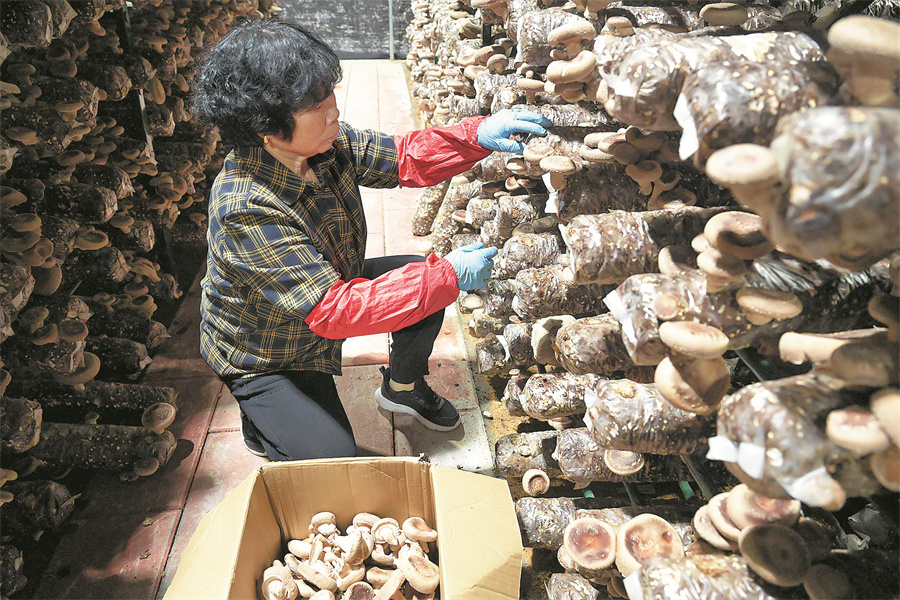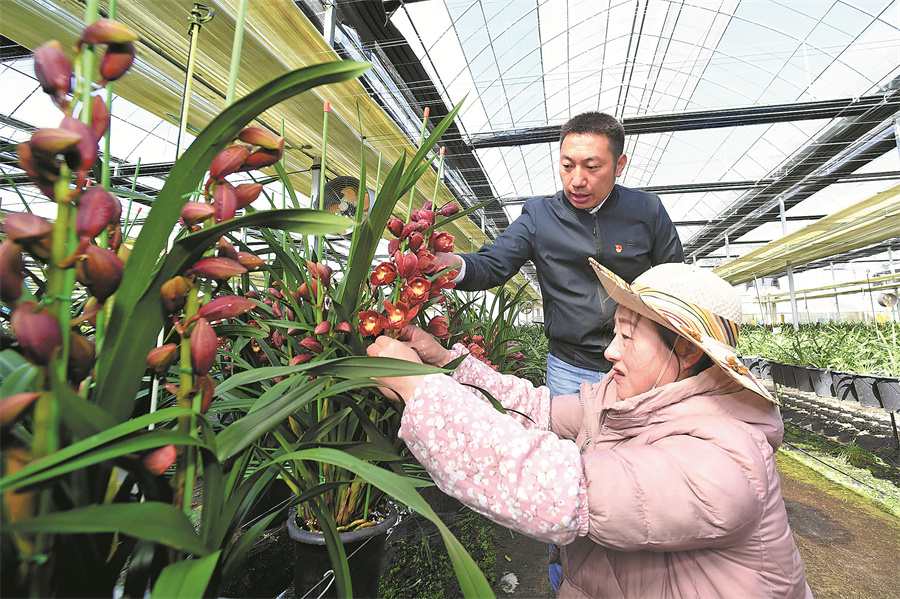Grassroots efforts bring far-reaching rewards

A new car completes assembly at the Ningde base of SAIC Motor Corp in Fujian province on Feb 7. [Photo/Xinhua]
Residents benefit from wide range of actions taken on their behalf
In the early 1990s, a small wooden boat was the home of Jiang Chengcai, which he shared with his wife, their three children and his father.
Jiang, 56, a resident of Xiaqi village, Ningde, Fujian province, said, "We often feared the boat would turn over, and that our lives were in danger when there were typhoons."
All villagers living on such boats wanted to move ashore for their children to be educated, said Jiang, who never had the chance to attend school.
Xi Jinping, general secretary of the Communist Party of China Central Committee, worked from 1988 to 1990 as Party chief of Ningde prefecture, Fujian. He often visited families living on the wooden boats, considering how to lift them out of poverty.
On many occasions, Xi has stressed the importance of Party and government officials promoting the Party's policy, conducting research, receiving complaints, and performing everyday work at the grassroots level.
He has emphasized that the Party chief of a county should visit all villages in the county, the Party chief of a city should visit all townships, and the Party chief of a province should visit all counties.
These field trips brought about changes. Jiang's family moved ashore in 1999, and more than 300 houses had been built locally by the end of 2000.
In one of Xi's trips to the village, he visited Jiang's home in 2000.
"He shook hands with me and asked if I could get used to life onshore. He also reminded me to work hard for a better life now that we lived in better conditions," Jiang said.
Since moving ashore, Jiang has taken part in training organized by the village on breeding razor clams, a business that brings him an annual income of more than 100,000 yuan ($14,000) on average.
Jiang also set up a construction and engineering team to undertake pile foundation projects for buildings in different cities. The team now comprises more than 60 people. Asked how much money the team could make, Jiang said only that he wants to remain modest and keep a low profile.
"I did not receive an education, so the key to my success is that I know what it is like to be poor. I have worked much harder than others, and seized the opportunities," he said.
These efforts made Jiang one of the first in the village to pursue a better life.
Zheng Yue'e, deputy Party secretary of Xiabaishi township, where the village is located, said Xiaqi now boasts neatly arranged rows of houses and straight roads, and the residents' average annual income has risen from 972 yuan in 1997 to more than 30,000 yuan this year. The village is also home to 320 people with a college education, up from none in 1997.
When Zheng was a small girl, her parents used to tie her to the family boat with a rope, fearing that she might fall into the sea by accident.
Elected Party chief of Xiaqi in 2012, Zheng has worked hard to help villagers lead better lives by developing seafood farming, as well as tourism, catering and logistics businesses.
She said township and village officials often visit local residents to see what they need, while municipal officials also conduct routine visits to inspect the progress made on infrastructure projects.
A seafood catering street being built in Xiaqi to attract travelers is expected to bring the village about 500,000 yuan in tax revenue each year, Zheng said.

A farmer picks mushrooms at a photovoltaic greenhouse in Shanyang township, Fujian, on Nov 17. [Photo/Xinhua]
Research mission
In July 1988, Xi, who was Ningde Party chief, visited Gutian county to conduct grassroots research. He said a new way out of poverty should be found based on local conditions, and that developing the mushroom industry should be the direction for Gutian to take in eliminating poverty.
He visited Gutian on six further occasions during his tenure in Fujian, emphasizing each time that the mountainous area was at a disadvantage, but also had a unique natural advantage.
In recent decades, Gutian residents have maximized the opportunity brought by the mushroom industry.
Last year, the county produced 910,000 metric tons of edible mushrooms, with a production value of 6.2 billion yuan. Jobs were created for more than 80,000 farmers.
Zheng Guidong, deputy Party secretary of Gutian, said the county is also working to build a new type of shed with photovoltaic panels installed on the roof to achieve green production of shiitake mushrooms.

E-commerce entrepreneur Yang Chenfen hosts a livestream broadcast to sell local speciality products. [Photo/Xinhua]
Since May 2021, eight photovoltaic mushroom bases have been built in the county, with a total investment of 370 million yuan.
The bases are expected to generate 31.74 million kilowatt hours of clean energy, and the farmers can use the electricity produced to dry the mushrooms, and for refrigeration, Zheng Guidong said.
Yu Xinkao, a mushroom farmer in Shanyang village, Gutian, started working from a new photovoltaic shed made from concrete and steel this year, forsaking his old wooden shed with a thatched roof. He has expanded his production significantly.
"The new shed has better ventilation, and as we no longer need to worry about fire hazards, I decided to increase production," Yu said.
He is one of the first farmers in the village to try the new shed, and Yu said that this year he expects to make 80,000 yuan more than he did last year from growing mushrooms.
Chen Xiaofang, Party secretary of Shanyang township, said farmers in Gutian have decades of experience in growing mushrooms.
She said plenty of electricity is required to dry out the mushrooms, but the electrical wiring used poses considerable fire hazards for the villagers.
Officials at different levels conducted field research at the grassroots level to try to solve the problems the farmers faced, which resulted in the new sheds being built, Chen said.

A researcher guides a farmer in planting orchids at a greenhouse in Puyuan township, Fujian, on Nov 17. [Photo/Xinhua]
Liang Weixin, Party secretary of Ningde, said officials in the city have visited residents at home to listen to their needs.
Officials and technicians have also been sent to villages to solve local problems.
The authorities in Ningde have created industries for each county based on local characteristics, such as the white tea of Fuding, the mushrooms of Gutian, and the large yellow fish of Jiaocheng.
More importantly, the city now has four major industries: producing lithium-ion batteries and new energy; new energy vehicles; stainless steel; and copper. These industries have a combined production value of some 523 billion yuan.
CATL, for example, has been the world's largest electric vehicle battery manufacturer for six consecutive years, while Tsingtuo Group is the world's largest manufacturer of stainless steel, Liang said. CATL said it earned revenue of 328.6 billion yuan last year, a year-on-year rise of 152 percent, while its net profits reached 30.7 billion yuan, up by 93 percent in 2021.
Lei Biaohua, chief engineer at the Bureau of Industry and Information Technology in Ningde, said the lithium battery and new energy vehicle industry is the biggest in the city, so the local government attaches great importance to its development.
The local authority has set up a special task force to work at CATL to examine and resolve problems the company might experience during its development, he said.
The task force is also responsible for offering a "babysitter-style" service to the company for business expansion, such as obtaining investment and more land.
Moreover, the task force has worked hard to attract businesses in CATL's upstream and downstream industry chain to move to Ningde to create an industrial cluster, Lei said.
For example, CATL's Cheliwan base was built in less than 20 months thanks to the government's efforts in streamlining service and solving problems at grassroots levels, he said.

A boat passes through the aquaculture zone in the Qixing sea area of Xinan township, Ningde city, Fujian, on Nov 18. The zone has been upgraded and improved since July 2007. [Photo/Xinhua]
Liang added that grassroots levels are important testing fields for Party and government officials. By working at such levels, they can make active decisions and solve real problems, while also bringing well-being to the people and creating better relations between the public, the government and the Party, he said.
More importantly, by seeing real progress made through their efforts, the officials work harder and now have greater ambitions, Liang said.
Ningde's GDP rose from 109.5 billion yuan in 2011 to 355.4 billion yuan last year, ranking fifth in Fujian, and the city's growth rate has remained in the top spot in the province for four consecutive years, he said.
"Local government officials used to rely on money from higher levels of government for development, but now we only ask for policy support, and do the rest ourselves," Liang added.
Photos
Related Stories
- China brings new impetus, opportunities to rest of world with its own development
- Experts pool wisdom to address global development challenges at forum
- C. China conference to focus on global development, security
- China's State Council stresses high-quality development of pharmaceutical, medical equipment industries
- China promotes people-centered high-quality development
- Contributing a Chinese solution to global development
- The best system for China
- Interview: Nigeria would learn from Chinese model of development -- official
- Interview: Panasonic determined to contribute to China's high-quality development -- Panasonic VP
- China steadfastly promotes high-quality development
Copyright © 2023 People's Daily Online. All Rights Reserved.









